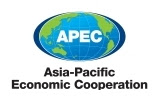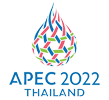 |  |
Deputy Prime Minister Supattanapong Punmeechaow's Statement on the APEC Small and Medium Enterprises Ministerial Meeting
Issued by the APEC Small and Medium Enterprises Ministerial MeetingThis morning, Supattanapong Punmeechaow, Thailand Deputy Prime Minister and Vice Chairman of the Thailand Board of SME Promotion, shared with ministers and high-level representatives from APEC’s 21 member economies a statement that reflects the outcomes of the 28th Meeting of APEC Small and Medium Enterprises, which he chaired on 9-10 September 2022.
The statement mapped the wide range of issues faced by startups and micro, small and medium enterprises (MSMEs) in the APEC region, and elaborated some solutions which were discussed by the ministers. These are encapsulated in the meeting’s theme—“Inclusive Recovery of APEC MSMEs through the Bio-Circular-Green Economy Model and a High Impact Ecosystem.”
Read the 2022 APEC Small and Medium Enterprises Ministerial Meeting Chair’s Statement
During the meeting, ministers said they will continue to foster economic growth, which benefits everyone, including small businesses and startups. They will help small businesses participate in the global economy and intend to restore and improve the connectivity among APEC economies through digital resilience, which will help MSMEs flourish and in turn contribute to the region’s recovery.
As laid out in the chair’s statement, the membership have agreed to do this by supporting of the following points in bold text:
- Acceleration of the Region’s Adoption of the Bio-Circular-Green Economy Model – Going bio-circular-green can open business opportunities and add value to the products and services of small businesses, while adding to the global effort to address climate change.
- Inclusive Digital Transformation – Digitalization affords small enterprises the tools to develop faster. MSMEs with digital skills can reach more customers, and are more resilient against disruptions such as the restrictions imposed under the COVID-19 pandemic.
- Financing and Debt Restructuring – MSMEs have difficulty borrowing “because they are small, less diversified and may have weaker financial structures.” Giving a small business access to finance liberates its potential, so ministers are encouraging measures to address lending constraints.
- Coping with an Evolving Market Landscape – A business environment that encourages startups, fosters innovation, promotes participation in global value chains, and empowers women and youth entrepreneurs, among others, will help MSMEs thrive and become more competitive.
The statement also demonstrates how APEC’s MSMEs ministers recognize that economic goals should include not just growth, but the wellbeing of people, inclusion, equity, as well as sustainability.
Read the 2022 APEC Small and Medium Enterprises Ministerial Meeting Chair’s Statement
For further details, please contact:
Masyitha Baziad +65 9751 2146 at mb@apec.org
Michael Chapnick +65 9647 4847 at mc@apec.org
Ministers Aim for Recovery, Resilience for Asia-Pacific’s Small Business
Issued by the 28th APEC Small and Medium Enterprises Ministerial Meeting
Minister-level officials and high-level representatives from APEC member economies met to put in place a plan for the crucial recovery of the region’s micro, small and medium enterprises (MSMEs), which were heavily impacted by lockdowns and restrictions over the past two years, and which continue to struggle in the post-pandemic world.
They convened in Phuket physically for the first time since 2019. This gathering of ministers concluded a week of engagements between officials, experts and entrepreneurs around the region who exchanged views on best policy practices in support of small business.
“The COVID-19 pandemic had brought about devastation to MSME businesses as they were impacted by supply chain disruption, market relocation and financial losses,” said Supattanapong Punmeechaow, Thailand Deputy Prime Minister and Vice Chairman of the Thailand Board of SME Promotion, who served as chair of the meeting. “Against their liquidity shortage, MSMEs also needed to make new investments in reskilling their workforce towards digital mode of services and productions.”
Minister Supattanapong acknowledged that even as the economy is reopening, small enterprises face new challenges.
“At the time we are currently convening, the world somehow has moved away from the COVID-19 pandemic, yet to confront an emerging global situation with adverse impacts on our MSMEs at no lesser intensity than the pandemic,” he said.
Minister Supattanapong referred to small businesses as “the driving engine of the APEC economies.”
"MSMEs account for 98 percent of total businesses in the APEC region and 40 to 60 percent of GDP in most APEC economies,” he said, citing data gathered by APEC MSME officials. “Without their inclusive recovery, we will not be able to achieve resilient and balanced economic growth.”
Ministers discussed four ways to drive this growth: accelerating the adoption of the bio-circular-green economy model; encouraging inclusive digital transformation; giving MSMEs access to financing while restructuring debt; and helping them cope with the evolving market landscape.
According to Dr Rebecca Sta Maria, Executive Director of the APEC Secretariat, MSMEs faced a variety of challenges even before COVID-19, such as sustainability, financing, and market access.
“The pandemic has only made their situation more complex,” she said.
She outlined the next steps for APEC to support MSMEs, such as helping them become more competitive in the global marketplace.
“MSMEs that export grow significantly faster than those that don’t,” Dr Sta Maria said. “Research indicates that SMEs in developing economies can increase productivity and innovation by selling abroad. Yet, despite the various initiatives undertaken, it appears that there is more to be done to facilitate MSMEs’ access and integration into global supply and value chains.”
“There is much in our to-do list,” she continued, “but we can achieve this through effective partnerships and cooperation, including between the public and private sectors, specifically, the APEC Business Advisory Council, and other regional and international organizations, and key stakeholders, including civil society.”
Currently, there are 23 projects and initiatives being implemented by APEC to address the challenges faced by the MSME sector with an emphasis on supporting their resilience and recovery in every aspect of business.
These initiatives are guided by APEC’s long-term vision for the next 20 years—the Putrajaya Vision 2040 and the Aotearoa Plan of Action—and current priorities under Thailand’s APEC hosting, such as efforts towards encouraging a bio-circular-green economy.
Upon concluding his remarks, Minister Supattanapong gave reassurance to MSMEs in APEC economies by quoting the theme of APEC 2022: “The APEC region will remain open to all opportunities, connected to all dimensions and balanced in all aspects so that they can leverage on the regional economic growth.”
For further details, please contact:
Masyitha Baziad +65 9751 2146 at mb@apec.org
Michael Chapnick +65 9647 4847 at mc@apec.org




























































